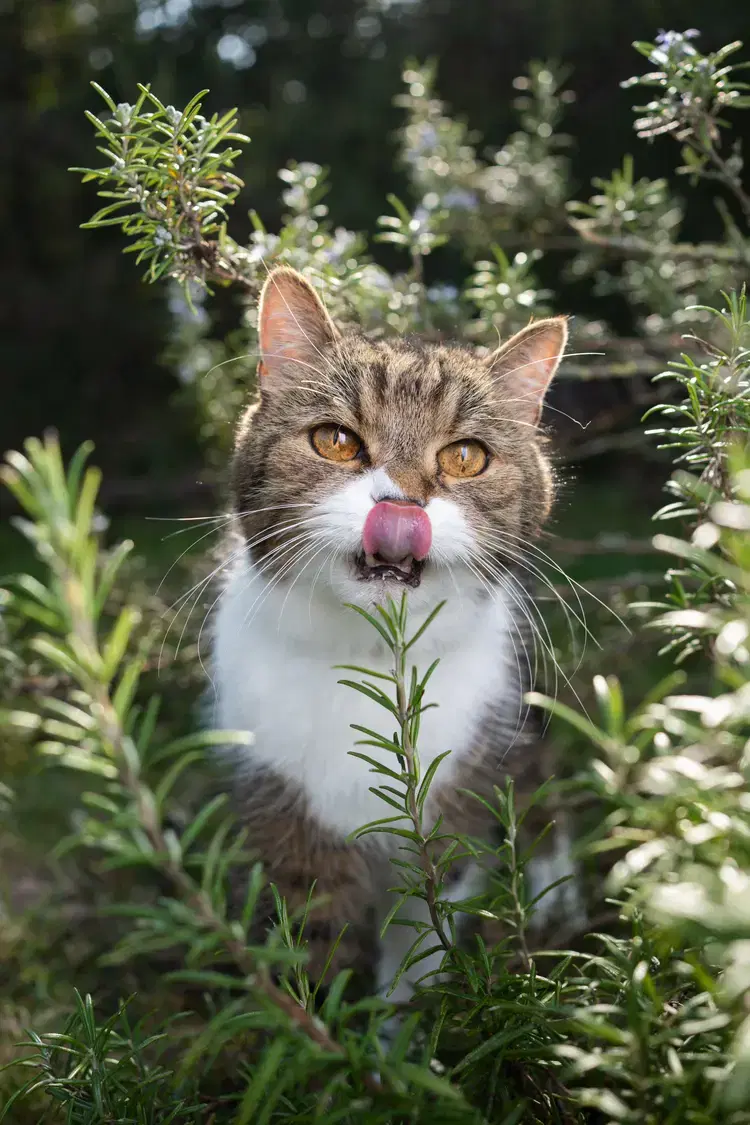Rosemary is an herb that is commonly used in various forms of cooking and is known for providing a variety of health benefits for people. For these reasons, plenty of individuals choose to grow rosemary at home, and cat parents may catch their pet sniffing or attempting to take a bite out of their rosemary plant. This is why pet parents need to know whether or not rosemary is toxic to cats.
What is rosemary?
Rosemary is a commonly used culinary herb with a lemon-pine flavor that tastes great when paired with lamb, pork, or even in a gin cocktail. It is a part of the Lamiaceae family which also includes herbs like mint and sage.
Is rosemary dangerous for cats?
The good news is that rosemary is a non-toxic herb, and eating small amounts isn't dangerous for a cat. That being said, cats are carnivorous and their digestive tracts are not suited for digesting large amounts of plants or herbs, so eating too much rosemary can have consequences.
Is rosemary safe for cats?
Rosemary is generally considered safe for cats when used in moderation and in controlled amounts. While some cats may be sensitive to certain herbs, including rosemary, most felines do not exhibit adverse reactions to the herb.
However, it is essential to avoid excessive consumption, as large quantities can lead to digestive upset or mild toxicity symptoms. It is advisable to consult with a veterinarian before introducing rosemary or any new herb into a cat's diet, especially for cats with pre-existing health conditions or sensitivities.
How to feed rosemary to your cat?
Although rosemary is typically considered safe for cats, it is important to be mindful of potential risks when introducing it to your pet's diet. Here are a few helpful tips to assist you in navigating this process.
Culinary Use: If you decide to feed your cat rosemary one way to do so is by finely chopping a pinch of rosemary and mixing it with your pet's cat food or treats.
Fresh Rosemary: Fresh rosemary may be better for your pet than the dried version. Before giving the rosemary to your pet, wash it to remove any pesticides or contamination that may be on the plant.
Moderation is Key: As discussed earlier, it's better to feed your cat rosemary in moderation. Start with a small amount and monitor your cat for any signs of a negative reaction like an upset stomach.
Monitor for Allergic Reactions: If you notice any signs of lethargy, an upset stomach, or see any unusual behavior after letting your cat try rosemary, it may mean that your cat is allergic and having a reaction. Contact your vet and keep them away from rosemary moving forward.
Consult with Your Vet: Before introducing any new herb or food to your cats, it is advisable to consult with your veterinarian to determine the right quantity and ensure its safety for consumption.
Health benefits of rosemary for your cat
Antioxidant Properties: The presence of antioxidant compounds in rosemary can be advantageous for your cat's immune system, providing support to their overall health.
Improves Digestive Health: Historically utilized for digestive purposes, rosemary is known to assist in feline digestion and help regulate their appetite.
Repellent Properties: Your cat may occasionally face issues with pests or insects. Rosemary, known for its insect-repellent properties, can contribute to your cat's well-being by helping keep these nuisances at bay.
Mood and Stress Management: While not yet proven, rosemary is believed to reduce stress, and may offer similar calming benefits to your cat.
Are rosemary essential oils safe for cats?
It might be tempting to assume that if a plant is safe for cats, then its oil should be too. Rosemary essential oil is commonly utilized by humans for its therapeutic advantages, providing relief from physical pain. However, contrary to this assumption, rosemary essential oil is not safe for cats. The oil contains compounds that can be toxic if ingested by your feline companion. Essential oils are significantly more concentrated, being 100 times stronger than the plant itself. Cats tend to accumulate these oils in their liver, potentially leading to liver damage. Therefore, it is advisable to keep your cat away from rosemary essential oil to prevent oil toxicity.
What are the symptoms of poisoning in cats?
As previously noted, essential oils, including rosemary essential oil, are significantly more concentrated than fresh rosemary. If your cat exhibits any adverse reactions in the presence of rosemary essential oil, it's crucial to promptly seek veterinary assistance. Be vigilant for the following symptoms in such cases
Diarrhea
Difficulty breathing
Difficulty walking
Drooling
Pawing or rubbing the face
Redness in the mouth or gums
Weakness or lethargy
Given that the severity of each case may vary, it is essential to exercise caution and prioritize the well-being of your cat.
Conclusion
In summary, rosemary is generally considered safe for cats when administered in moderation, especially as a herb for flavoring their food. However, before introducing rosemary to your cat's diet, consult with your veterinarian. While rosemary is generally safe, its essential oil contains compounds that may pose health risks to cats. Therefore, it is essential to be mindful of this distinction. Ultimately, prioritizing the safety of your cat is paramount, and careful monitoring of their reactions to any new herb is recommended to help ensure their health and safety.

If you need a story or someone to talk to your cat like a person, I’m your person. With 3 cats, 1 dog, and a lifetime of pets, I write from experience, usually with a cat on my keyboard and a dog in my lap.
Waynick, Liz. "Is Rosemary Safe for Cats?" The Spruce Pets, 25 Sep. 2025, https://www.thesprucepets.com/is-rosemary-safe-for-cats-6828205.
Boyers, Lindsay. "Can Cats Eat Rosemary?" Chewy, 30 Apr. 2025, https://www.chewy.com/education/cat/food-and-nutrition/can-cats-eat-rosemary.
"Is Rosemary Safe for Cats?" VetriScience, 31 Jul. 2025, https://blog.vetriscience.com/is-rosemary-safe-for-cats.
The information presented in this article is for educational and informational purposes only and does not constitute or substitute for the advice of your veterinarian.











